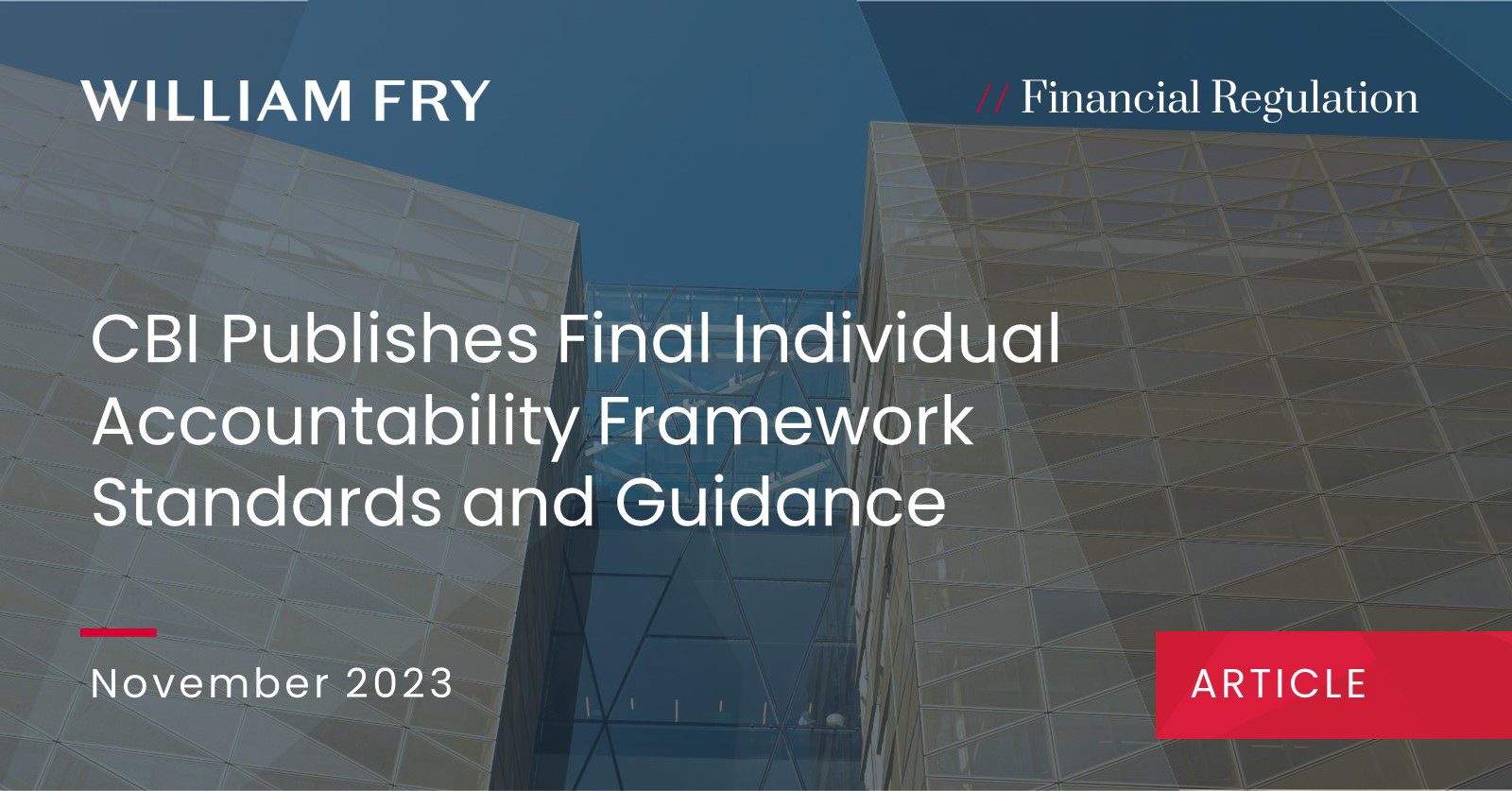On 16 November 2023, following a consultation process on Consultation Paper 153 (CP153), the Central Bank published a Feedback Statement and issued final form Regulations and Guidance to firms on the Individual Accountability Framework (IAF).
These set out the Central Bank’s expectations for the implementation of three aspects of the IAF:
- Senior Executive Accountability Framework (SEAR) (applicable to in-scope firms from 1 July 2024 (with a 12-month deferral for (Independent) Non-Executive Directors to 1 July 2025);
- Conduct Standards (applicable from 29 December 2023) (except for the Business Standards, which will not be effective until the revised Consumer Protection Code is implemented); and
- Enhancements to the Fitness & Probity regime (applicable from 29 December 2023).
A. General
The Central Bank considered industry submissions under the IAF consultation process and attended several stakeholder and engagement events to hear more from respondents on their written submissions. This has led to several technical and clarificatory changes to the draft IAF Regulations and Guidance and resulted in some changes in the Central Bank’s approach to implementing the IAF as highlighted below.
The Central Bank continues to emphasise that its approach to the implementation and supervision of IAF will be based on the principles of proportionality, predictability and reasonable expectations.
B. SEAR
(I)NED deferral – For firms falling in scope for the first phase of SEAR, the introduction of SEAR for (Independent) Non-Executive Directors will be deferred by one year to 1 July 2025.
Materiality threshold in the application of SEAR to managers of outgoing branches – The Central Bank is considering the introduction of a materiality threshold in applying SEAR to managers of outgoing branches. If this happens, the Central Bank will amend the PCF Regulations and issue guidance on the operation of such material threshold over the coming weeks.
Inherent and prescribed responsibilities – Amendments have been made to the list of Inherent Responsibilities and the list of Prescribed Responsibilities (PRs). Certain PRs have been removed, merged, or transferred from the general list of PRs to the sector or circumstance-specific list of PRs. This results in a shorter list of PRs. For example:
- PR8 relating to adequate consideration of the impact of key business initiatives and strategic decisions and PR26 relating to developing a framework for and monitoring the implementation of the conduct requirements have been removed from the list of PRs;
- PR29, PR4 and PR5 which relate in various ways to a firm’s culture, including matters relating to diversity and inclusion, have been merged;
- PR19 relating to the firm’s treasury management and PR23 regarding compliance with client asset requirements have been moved from the general list of PRs to the sector or circumstance-specific list of PRs.
The Central Bank has confirmed that all PRs will apply to low impact insurance undertakings.
Sharing job roles/responsibilities – Sharing job roles/responsibilities – The Central Bank has amended its Guidance to provide greater clarity on pre-approval controlled function (PCF) role sharing and has set out the limited specific instances where the sharing of PCF roles may be permitted.
The first instance is where two individuals share a PCF role on a job-sharing basis. Here the Inherent Responsibilities and other responsibilities must be allocated jointly and the details of job-sharing arrangements must be set out clearly in each individual’s Statement of Responsibilities and on the Management Responsibilities Map.
The second instance is where a single PCF role consists of two distinct business lines and no one individual is responsible for a single PCF role. The only PCF roles that could only be shared by two individuals based on the business line are the following:
- PCF-18 Head of Underwriting taking into consideration retail and corporate business lines;
- PCF-19 Head of Investment (applicable to insurance undertakings), PCF-29 Head of Trading or PCF-30 Chief Investment Officer (applicable to investment firms), taking into consideration different investment types (i.e. equity and bonds).
The Inherent Responsibilities applicable to the PCF role would apply in full to each individual and it would be appropriate for the Prescribed Responsibilities allocated to that PCF to be assigned in full to each individual. The distinction amongst the roles should be clearly defined in each individual’s Statement of Responsibilities and set out on the Management Responsibilities Map.
Statements of Responsibilities and Management Responsibilities Maps – The Central Bank has re-stated that Statements of Responsibilities and Management Responsibilities Maps are living documents, which must be kept up-to-date and submitted upon request. A 10-year retention period will apply to these documents. The template Statement of Responsibilities and the infographic for the Management Responsibilities Map will be updated to reflect comments received during the consultation. The Central Bank will issue more detailed operational guidance on the completion and submission of relevant documents in due course.
C. Conduct Standards
Although the conduct standards applicable to individuals (Common Conduct Standards and Additional Conduct Standards) will apply from 29 December 2023, the Central Bank reiterated that the conduct standards applicable to regulated firms (Business Conduct Standards) will not be effective until the revised Consumer Protection Code is implemented. Please see our article here for further information on the Consumer Protection Code review.
Some technical and clarificatory updates to language have been made in relation to conduct standards and the Guidance on the Conduct Standards.
D. Enhancements to Fitness and Probity Regime
Certification – The Guidance has been amended to limit the scope of the enhanced due diligence aspect of the certification requirement to PCFs, CF1s and CF2s and to facilitate self-certification in respect of CF3s to CF11s, to reduce the potential administrative burden on firms and mitigate certain logistical and technological challenges for firms.
Disciplinary actions – The Central Bank has removed the additional obligation for a firm to report to the Central Bank where formal disciplinary action has been concluded against an individual in respect of a breach of the Conduct Standards.
Holding companies – The IAF Guidance contains clarificatory updates and confirms that, in line with current practices when new PCF roles are created, the Central Bank will provide operational guidance for those persons already performing the new roles at implementation, including an automated process and a consolidated in-situ process, so that those persons do not have to submit an Individual Questionnaire.
E. Other
Three-year review – Three years after the implementation of the IAF, a review will be conducted by the Central Bank to assess the functioning of the IAF, how the benefits and costs are being realised in practice and whether any changes should be introduced.
Phased application of SEAR – The Central Bank plans to widen the scope of application of SEAR over time to sectors other than those captured in the first phase of SEAR (i.e. credit institutions (excluding credit unions) certain insurance undertakings and investment firms and incoming third-country branches of same). Lessons from phase one of SEAR, including from the three-year review, will be incorporated into such a roll-out.
Outsourcing – The IAF Guidance has been amended to clarify the applicability of elements of the IAF where outsourcing arrangements are in place.
The definition of PR21 has been amended to take account of feedback from the consultation.
Temporary appointments – The Central Bank has acknowledged stakeholder confusion and updated its Guidance to clearly distinguish between individuals pre-approved as PCFs temporarily and PCFs appointed in exceptional circumstances as temporary officers.
Reasonable Steps – Some minor clarificatory (rather than substantive) changes have been made to the Guidance on reasonable steps.
How we can help
William Fry has been assisting regulated financial service providers with their preparations for the individual accountability regime and our IAF/SEAR team is available to help firms with their IAF/SEAR implementation projects.
Please visit our dedicated Individual Accountability & SEAR web page for our analysis and commentary to date.
For further information on the Feedback Statement and associated IAF Guidance and Regulations, please see the Central Bank press release.
Contact Us
For more information, please contact Shane Kelleher, Louise Harrison, Hilary Rogers or any member of the Financial Regulation unit or your usual William Fry contact.
Contributed by Jane Balfe




